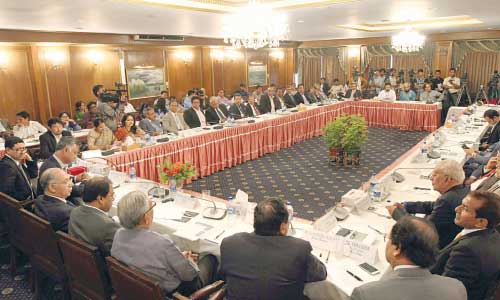Poorly-coordinated policies, political instability affecting investment
Experts and businesses at a discussion on Saturday said lack of political stability and poorly-coordinated government policies were the major problems for boosting the country’s investment.
They said persistent uncertainty on the political front, increasing corruption and outdated policies were hurting the investment scenario and an immediate government attention to the issues was needed to achieve 8 per cent growth.
The Metropolitan Chamber of Commerce and Industry and the South Asian Network on Economic Modelling organised the discussion titled ‘a new investment regime for Bangladesh’ at the MCCI auditorium in the capital.
MCCI president Syed Nasim Manzur moderated the meeting.
In the keynote paper, Selim Raihan, who teaches economics at Dhaka University, said, ‘There has been no major policy reform after the 90s. We are still operating under the old ones and a second generation policy reform is crucial at this moment.’
He said the foreign investors were not concerned about the increasing corruption.
‘But what I believe is that even after giving money they [foreign investors] are not delivered what they have been promised,’ he said.
Uttara Group chairman Matiur Rahman said the government’s attitude towards the private sector was very unfriendly.
‘It is unbelievable how we are treated. We literally have to go from table to table, ministry to ministry in order to get any job done. Besides, the government is not able to provide gas, power and land but it permits us to establish industry,’ he said.
Western Marine Shipyard chairman Saiful Islam said a decreased profitability over the years had also affected the private sector.
‘The cost of doing business, taxes and others are increasing very rapidly, but compared with that the profitability is decreasing. That’s why the private investment is also shrinking,’ he said.
Former Bangladesh Bank governor Farashuddin Ahmed said the failure in elevating the direct tax had affected the overall investment scenario.
‘As direct tax has not increased, so the trade tax has to carry more loads that discourages the investment,’ he said.
He said the BB recently announced the monetary policy for the first half of the fiscal year.
‘But we need to come out from the contractionary monetary policy. We had higher inflation and the Bangladesh Bank tackled it effectively. But, now, it is enough. We should allow money flow to the market,’ he said.
Farashuddin also said that country’s private banks were equally corrupted like the state-owned ones.
Bangladesh Board of Investment chairman Abdus Samad said the country’s economic policies were very poorly coordinated.
‘Our tax regime facilitates trade but punishes manufacturing. So it took its toll on the investment,’ he said.
He said the government had taken a number of steps and the process for the foreign investors had been made easier.
‘However, the KEPZ issue is affecting the investment climate,’ he said.
- See more at: http://newagebd.net/143093/poorly-coordinated-policies-political-instability-affecting-investment/#sthash.d8dsr4Ah.dpuf











